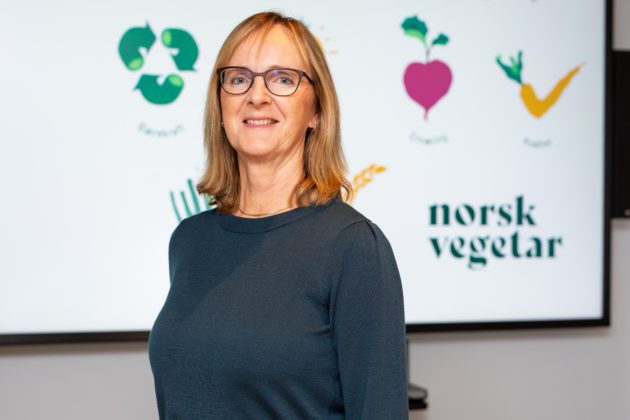Norwegian, natural and nutritious vegetarian products

Scientists from Nofima and the food industry have developed tasty vegetarian prototypes that are of high nutritional quality and made from Norwegian plant-based produce. The prototypes can form the bases for a variety of plant-based products and meals.
Many people eat, and want to eat, a more plant-based diet. Most people have no desire to become vegetarians, but they still want plant-based produce to play a bigger role on their dinner plates. At the same time, many people want plant-based alternatives that are made from Norwegian raw produce, and this is where the choice becomes rather limited.
This was the background for the NORSKVegetar innovation project. The project is owned by the meat producer Jæder, and Nofima is a research partner.
The best of both worlds!
“We like being innovative, flexible and forward-looking. Today, we are a proud supplier of Norwegian meat products, and we want to become a proud supplier of Norwegian vegetarian products as well. Basically, we are cheering for Norwegian food producers”, says Jæder’s Marketing and Sustainability Manager Rakel Kyvik Wester.
She adds that they see NORSKVegetar as a natural progression of GRØNTiKJØTT, another innovation project together with Nofima. “In collaboration, we developed meat products that contained up to 49 percent vegetables, using a proportion of rest raw materials from the processing of deep-frozen vegetables. These products make up the +Grønt product range and have been well received in the market.”
Using different vegetables to ensure good nutritional quality and preferably rest raw materials is also a goal in the development of the new plant-based products.
Close collaboration in the value chain is crucial
In the prototypes developed so far in the project, combinations of raw materials, protein fractions and texturising ingredients are based on legumes and grains. Test production of the prototypes based on the raw material ingredients has been carried out in Nofima’s pilot plants. These plants have the equipment needed to make such ingredients and prototypes in smaller volumes. Developing technology and improving processes for the best possible processing of Norwegian plant-based raw materials are key topics in the project.
A prerequisite for producing Norwegian vegetarian products in industrial volumes is the availability of all types of raw materials and ingredients that are adapted to production throughout the entire year. There are Norwegian protein crops (peas, beans and grains) that can be processed in Norway, but there are greater challenges when it comes to processing vegetables from open fields and greenhouses.
“It is not as simple as just using sliced vegetables directly in the final product. The raw materials must be gently processed into suitable ingredients that function well when combined with other ingredients in the product. It should be able to withstand being heated up more than once,” says Nofima Senior Scientist Grethe Iren Borge. She heads the research work taking place in the project.
The Nofima scientists have further processed raw materials of different quality into ingredients. The goal is to create ingredients with stable quality and shelf life, and which can easily be used in complex vegetarian products, or further processed directly into a finished plant-based product.
“Focusing on the challenges related to Norwegian processing and production is also an important part of NORSKVegetar. Compared to dried beans, fresh vegetables pose a completely different logistical and quality challenge. An overripe tomato cannot wait until tomorrow, for example. We show what is technically possible, while producers must decide what is possible and desirable for them to invest in in the future”, says Grethe Iren.
“Close collaboration between all sections of the value chain is crucial. We have gathered many good partners in the project, and are looking at how we can create good, long-term and value-creating collaborations together”, says Rakel.
Innovative processes for creating food enjoyment together
Developing new technology solutions that can make it easier for Norwegian food processing companies to produce ingredients based on Norwegian plant-based raw materials is a very ambitious goal. Nevertheless, this is an important goal of the project.
“In the beginning, it was about identifying which of the raw materials, ingredients and technologies are available to us and which are suitable for vegetarian products. We then developed many ideas and a scope of opportunity where we selected three focus categories, and the partners decided which of the categories they wanted to be involved with”, says Nofima Innovation Scientist Antje Gonera.
The process was facilitated by Nofima’s Innovation Group including senior scientist Antje Gonera and senior adviser Stine Alm Hersleth. It is important to come up with ideas and solutions together, create a safe and open atmosphere while providing a common thread/roadmap and toolbox with which to innovate. Learning from each other, showcasing products that you work with or have bought in the store, tasting prototypes together, and involving the producers’ chefs and product developers in the project is worth its weight in gold.
Key insights
Among the impulses for the development work are insights that Nofima scientists have arrived at in the past.
Such as that many consumers:
- find it difficult to make vegetarian dinner options that are nutritionally adequate
- want to eat Norwegian food
- are concerned with naturalness and sceptical of vegetarian dishes that are ultra-processed.
These insights and other factors have been used in the development work.
“The consumers’ wish for natural products is important to listen to. In addition to using vegetables, grains and legumes in the prototypes, we also focus on different types of excipients used in vegetarian products, such as emulsifiers, texturisers and colours. Among other things, we will gain more knowledge about how natural raw materials and fractions from the processes can work in the products”, explains Grethe Iren.
The partners have met at several workshops, and the project participants took challenges in their stride by conducting digital meetings during the corona pandemic. They have worked according to a design thinking model.
“We have defined and determined focus categories based on discussions and reflections regarding opportunities and challenges”, explains Antje. Rakel also states that the feedback they have received is useful, especially for correcting and further developing the prototypes.
Well delivered!
Nofima and Jæder are now conducting workshops with the project partners who are close to the market and have a lot of direct customer contact. Nofima Senior Adviser Stine Alm Hersleth is leading this work.
First up was the food box supplier GodtLevert (meaning Well Delivered). Their chefs and product development team participated. They tested prototypes, made tastings and discussed their findings.
“Based on the design thinking mindset, we have created an innovation tool that facilitates simple prototype tests. The goal is to learn from real customers, so that we can make improvements during the development process and therefore make more of an impact in the market when we launch”, explains Stine.
Research facts
The research has been carried out in the three-year innovation project called NORSKVegetar (Norwegian vegetables, legumes and grains in sustainable vegetarian products). The project is financed by the Research Funding for Agriculture and the Food Industry and participating companies.
The project is owned by the meat producer Jæder, and Nofima is the main research partner. Other partners represent the entire food value chain: Norrek Dypfrys AS, Miljøgartneriet AS, Jone Wiig Gartneri AS, Skjelfoss Korn AS, Stangeland Mølle AS, AM Nutrition AS, Alna AS, Alimenta AS, Fjordkjøkken AS, Fjordland AS, Nordic Choice Hospitality Group AS and Godtlevertgruppen AS. In addition to Nofima, Igelösa Life Science AB participates as a foreign research partner.
The project started in October 2020 and will end in September 2023.
Research areas
Food processing technologies
Product development
Diet and health
Raw material knowledge
Research facilities


